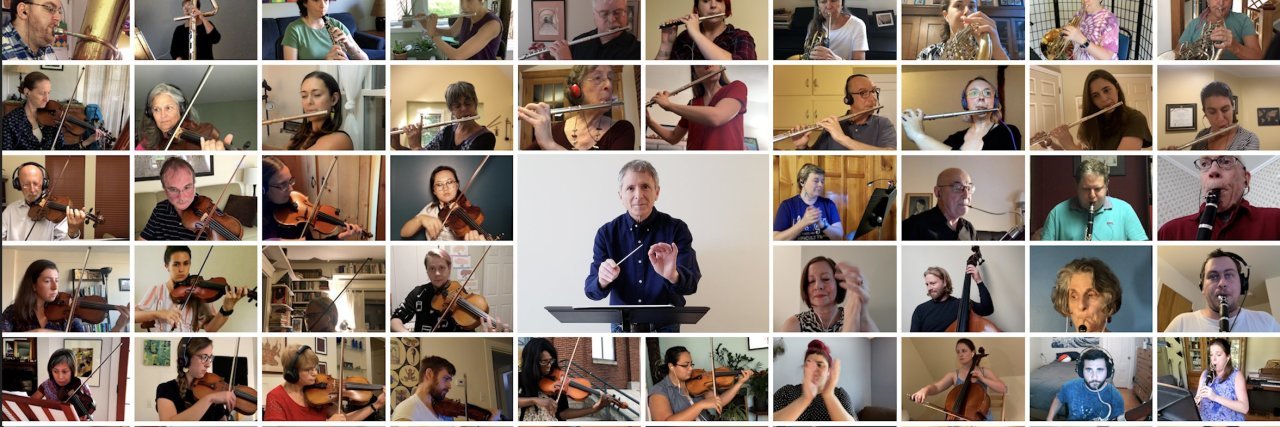One Orchestra Wants Mental Health to be Applauded in A ‘Monumental’ Way
The Monumental Moments™ initiative creates a platform to foster community and support people who live with mental illness. To learn more about Monumental Moments™ and participate in the initiative, click here.

As an orchestra conductor, Ronald Braunstein was diagnosed with bipolar disorder and decided to combine two passions in his life: supporting people with mental illness and music. After experiencing decades of stigma in his professional life, Ronald decided in 2011 to create a safe, stigma-free zone for musicians living with mental health conditions. Braunstein worked with his wife Caroline Whiddon, a classically trained French horn player who lives with depression and an anxiety disorder, and the two decided to create Me2/Orchestra in Burlington, Vermont.
“We put out a press release to announce the formation of Me2/Orchestra, and then seven people came to the first meeting, wanting to be part of our new musical organization,” Braunstein recalled. “We picked the name Me2/Orchestra because when we talked about how we felt isolated and stigmatized upon receiving our mental illness diagnoses, so many people who joined our group responded, ‘me too.’”
Whiddon shared that it was crucial for Me2/Orchestra to be a place where musicians with mental illness could practice and perform in a stigma-free zone. “We’re a non-auditioned orchestra that rehearses weekly and by being transparent about our own mental health conditions, made it a place that welcomed people that experienced similar barriers,” Whiddon said.
In 2014 and 2019, two different branches of Me2/Orchestra were launched in New England, Me2/Boston and Me2/Manchester. Before the COVID-19 pandemic made live performances difficult, Me2/Orchestra held three to four concerts a year at traditional concert venues and inside correctional and rehabilitation facilities to reach those living with mental health challenges.
For people who live with mental illness, it is important to continue using coping skills and connecting with others to help bring them joy. “Part of the therapy that we all experienced together was coming together in large groups to make music and all of the sudden, during the pandemic, we couldn’t do that anymore,” said Whiddon. Typically, we practice in-person as a large group but because of the pandemic that made things difficult. Me2/Orchestra found creative ways to continue to use music to bring happiness to their lives and those of others.
The Me2/Orchestra partnered with Neurocrine Biosciences for the Monumental Moments™ initiative, a platform that aims to foster community and support people who live with mental illness, to create a virtual musical score. “Everyone was super eager to participate in the performance of the piece,” Whiddon said. “We collaborated virtually with award-winning composer Paul Swartzel to create the score and performance together.”
When collaborating with Swartzel, Me2/Orchestra was drawn to hope. “The score was inspired by moments of discovery, joy, and perseverance through difficult days and features 88 Me2/Orchestra members,”
Whiddon said. “People of all ages wanted to take part in our performance, and they range between 20 to 80 years old and come from across the country and the world.”
Whiddon said that being part of Monumental Moments™ also gave the musicians in Me2/Orchestra something to look forward to during these challenging times. “The chance to be a part of Monumental Moments™ is very special to us, because we’ve both struggled with mental health conditions and together have found music to be an artistic medium that lifts our spirits, helps improve our mental well-being, and ultimately, brings people together,” Whiddon said. People can watch the performance below.
Me2/Orchestra also invites people to share their monumental moments they have experienced, both big and small. Your public post on social media using the hashtag, #MonumentalMoments will help support people living with mental health conditions, including those living with an involuntary movement disorder called tardive dyskinesia (TD). On behalf of posts shared, Neurocrine Biosciences is making donations to mental health organizations as part of its commitment to support people living with mental illness.
© 2021 Neurocrine Biosciences, Inc. All Rights Reserved.CP-TD-US-0879 06/2021

